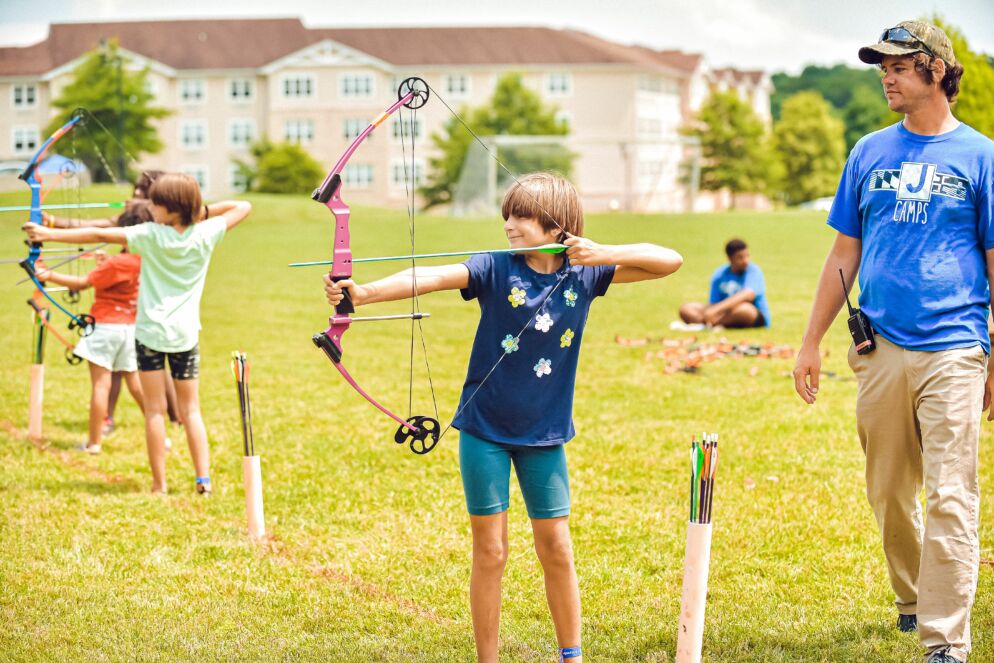
Choose your own adventure novels conjure up an image of a worn paperback book with sticky notes and bent page corners, ready in case you need to go back and make the right choice.
When kids are getting ready for camp season the choices ahead can be daunting. Day camp or overnights? Athletics or arts? The choices only get more complex when it comes to picking out a schedule – but the camp directors are here to help.
Many camps have set schedules that make them ideal for a well-rounded day or week — but what goes into structuring the day? How can your family use this input when kids are in the driver’s seat?
At camps that give kids more flexibility to choose, here are some things for your child to keep in mind when selecting activities so they can get the most out of their camp experience.
Know Your Interests
Camp counselors and directors are experts at building schedules to suit your child’s needs, but a great set of activities is not always one-size-fits-all. For camps with 20, 30, 40 or even 50 activities to choose from, it’s best to go with the child’s gut.
At Camp Tall Timbers, an overnight camp in West Virginia with 30+ activities, children are asked to pick 15 — with the ones they like most repeating, said owner and director Glenn Smith.
But camp staff won’t leave it all up to them. Younger campers especially may need some direction. Camp staff can help by focusing on a camper’s skill level, goals for the camp session and creating a well-rounded session.
For the children in fourth grade and below at Tall Timbers, Smith said, the kids pick nine activities and the camp picks two of them, and all activities are then assigned to different days. Smith said this format allows kids to know what they can expect and allows anticipation to build.
“We do that because we want them to get exposure to all the things in camp,” Smith explained. “We want you to get a broader base of activities, so we pick a couple of activities that we think you should give a try.”
But knowing a child’s favorite activities aids in having them try something new — as they will always have that security in having a thing or two they know they will enjoy.
There is often a wide variety to choose from even within one area of interest — such as circus arts. In Circus Camps Stars, a circus day camp that includes sessions in Baltimore and Howard counties, owner and director Michael Rosman said it’s best to let kids gravitate toward the skills they find most stimulating.
“If we get a bunch of athletes, they might want to do more of the acrobatics and gymnastics stuff, but if we get a bunch of drama kids they might want to do more of the clowning,” Rosman said. “We want them to try everything, but we want them to focus on what they like.”
Even if your child chooses to focus on one or more skills one year, they can choose a different adventure the next. Many kids come back to circus camp the next year to continue honing their skills and picking up new ones, Rosman said. Many of his former students have also gone on to perform professionally on their own and alongside him or the other teachers who are also circus performers.
The ability to do hard things and keep trying is a vital life skill, and kids excel when they can find their passion and run with it. If your child knows what they like, let them lean into it with their camp choice.
Create Some Balance
By being able to choose to spend more time at an activity, kids learn how to add balance to their daily activities and employ self-regulation, said Gia Codispoti, assistant director at Independent Lake Camp, an overnight camp in Wayne County, Pennsylvania.
She advised that kids should have some balance in their days by choosing at least one activity in a different department — like circus, sports, art or skatepark at Independent Lake.
Bradley Kerxton, senior director of J Camps — a day camp with a set schedule — includes a balance of physical activity throughout the day. J Camps limits the amount of physical activity right after lunch, but outside of that, staff infuse physical activity throughout the day.
Codispoti recommended including movement and a more active schedule in a camp day because it’s not always as readily available back home.
“Camp is a time for children to explore their varied interests. Most camps provide for movement and a culture that supports kids in finding fun ways to be active — who may otherwise spend too much time on screens,” Codispoti said.
Are There Any Essentials?
One activity directors say should be in every camper’s summer schedule is swimming.
“We do encourage everybody to take a swim class because we think it’s important for people to be able to swim,” Smith said. “We feel it’s an obligation for us to teach people — if you went into the pool, could you get out of the pool.”
Another critical component of day and overnight camps is socialization. Over the summer many kids see their peers less frequently. During the pandemic, we came to better understand the weight of loneliness and isolation on young minds.
“Camp is all about making meaningful connections and we make sure that campers are being social in all our activities,” Kerxton said.
At J Camps, the week begins with get-to-know-you games, which help campers get comfortable with one another in the group. Having your camper start the day with a more social activity sets them up for success, as those relationships will have more time to grow and develop over the course of their camp experience.
But at the end of the day, Codispoti said, there is no “one-size-fits-all” schedule, Codispoti says.
Elective or choice-based camps are highly individualized because kids are highly individualized, she explained. For example, if your child has more energy in the afternoon, it might be better for them to schedule an activity that demands a lot of energy then. If your child is less of a morning person, it may be best to save social activities for later in the day, after they’ve had time to wake up.
Smith said camp is a growing experience no matter what activities the kids pick. “Kids grow independence, they get self-confidence in this sort of setting.”







